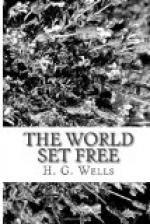For example, Barnet describes the London crowd as noisily patriotic when presently his battalion came up from the depot to London, to entrain for the French frontier. He tells of children and women and lads and old men cheering and shouting, of the streets and rows hung with the flags of the Allied Powers, of a real enthusiasm even among the destitute and unemployed. The Labour Bureaux were now partially transformed into enrolment offices, and were centres of hotly patriotic excitement. At every convenient place upon the line on either side of the Channel Tunnel there were enthusiastic spectators, and the feeling in the regiment, if a little stiffened and darkened by grim anticipations, was none the less warlike.
But all this emotion was the fickle emotion of minds without established ideas; it was with most of them, Barnet says, as it was with himself, a natural response to collective movement, and to martial sounds and colours, and the exhilarating challenge of vague dangers. And people had been so long oppressed by the threat of and preparation for war that its arrival came with an effect of positive relief.
Section 2
The plan of campaign of the Allies assigned the defence of the lower Meuse to the English, and the troop-trains were run direct from the various British depots to the points in the Ardennes where they were intended to entrench themselves.
Most of the documents bearing upon the campaign were destroyed during the war, from the first the scheme of the Allies seems to have been confused, but it is highly probable that the formation of an aerial park in this region, from which attacks could be made upon the vast industrial plant of the lower Rhine, and a flanking raid through Holland upon the German naval establishments at the mouth of the Elbe, were integral parts of the original project. Nothing of this was known to such pawns in the game as Barnet and his company, whose business it was to do what they were told by the mysterious intelligences at the direction of things in Paris, to which city the Whitehall staff had also been transferred. From first to last these directing intelligences remained mysterious to the body of the army, veiled under the name of ‘Orders.’ There was no Napoleon, no Caesar to embody enthusiasm. Barnet says, ’We talked of Them. They are sending us up into Luxembourg. They are going to turn the Central European right.’
Behind the veil of this vagueness the little group of more or less worthy men which constituted Headquarters was beginning to realise the enormity of the thing it was supposed to control....




